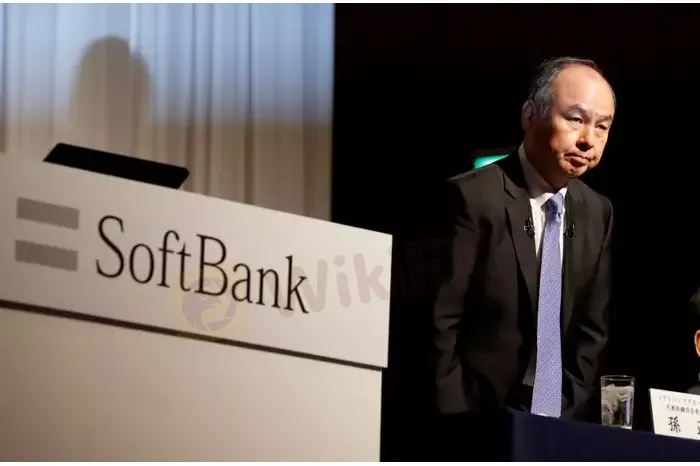简体中文
繁體中文
English
Pусский
日本語
ภาษาไทย
Tiếng Việt
Bahasa Indonesia
Español
हिन्दी
Filippiiniläinen
Français
Deutsch
Português
Türkçe
한국어
العربية
Vision Fund slide points to more pain for SoftBank’s Son
Abstract:Sliding valuations in the listed portfolio of SoftBank Group Corp’s Vision Fund unit point to more pain for CEO Masayoshi Son when the group reports April-June earnings on Monday as investors go cool on the high-growth firms he favours.

Vision Funds public portfolio first-quarter loss could top $10 billion, Redex Research analyst Kirk Boodry estimated, after falls in robotics firm AutoStore Holdings Ltd, e-commerce firm Coupang Inc and artificial intelligence firm SenseTime Group Inc, whose shares fell by almost half on the last day of June.
While there is limited visibility on valuations of Vision Funds private portfolio, writedowns contributed to the record $26 billion Vision Fund loss reported in May as investor concern over prospects for high-growth stocks feeds through to private markets.
The extent of the reevaluation was underscored when Swedish payment firm Klarna last month raised capital at a valuation 85% lower than at a SoftBank-led funding round the year before.
Writedowns in the private portfolio are unlikely to reflect the current weakness in valuations in the market, Jefferies analyst Atul Goyal said.
Chief Executive Son had been investing rapidly through the second Vision Fund, in which he has a personal stake, but in May pledged to “play defence” and reign in spending amid market turmoil triggered by rising interest rates and political instability.
The 64-year-old billionaire previously racked up personal losses betting on derivatives and publicly traded stocks through the SB Northstar trading arm, which has since been shuttered.
Compounding uncertainty at the tech conglomerate is the departure of a string of Son‘s lieutenants. A key architect of SoftBank’s push into investing in late-stage startups, Rajeev Misra, has stepped back from managing Vision Fund 2 to launch his own fund.
The cost of insuring against a default in SoftBank‘s debt and its bond yields remains elevated, albeit off last month’s highs, and analysts point to the conglomerates constrained financing options given the portfolio weakness.
“Within Vision Fund itself, in the public holdings they have they don‘t really have a lot of options,” said Redex Research’s Boodry.
SoftBank has been reliant on its large and liquid stake in e-commerce firm Alibaba Group Holding Ltd for financing. The group has now raised as much as $22 billion using the shares, the Financial Times estimated.
The conglomerate is targeting an initial public offering for chip designer Arm in the United States following the collapse of a sale to Nvidia Corp but analysts question the prospects for the listing.
SoftBank launched a 1 trillion yen ($7.5 billion) buyback last November, supporting shares which have fallen by about half from highs in March 2021, but had used more than 60% of the capital by late June.

Disclaimer:
The views in this article only represent the author's personal views, and do not constitute investment advice on this platform. This platform does not guarantee the accuracy, completeness and timeliness of the information in the article, and will not be liable for any loss caused by the use of or reliance on the information in the article.
Read more

What Happens If You Trade on Illegal Forex Platforms in India?
There are many illegal platforms that offer financial services to clients. These scammers hide the risks involved because their main goal is to steal your money. That’s why it’s so important to understand the dangers of trading on illegal forex platforms

Exposing Trade Capital Limited - Siphoning Millions, Restricting Withdrawals, Charging Extra Fees
Trade Capital Limited is in the news for conducting bad practices as a forex broker. Check out the unethical practices employed by it to scam investors in this article.

US Federal Reserve May Cut Interest Rates in September, Says Goldman Sachs
US Federal Reserve Chair Jerome Powell may slash the policy rate in September 2025, according to research economists at Goldman Sachs. Read this to learn more.

5 Serious Warnings About Mirrox! You Can’t Afford to Ignore
Pay Attention! This is a serious warning you shouldn't ignore. Check out this article and know the 5 red flags about the Mirrox that every trader must be aware of.
WikiFX Broker
Latest News
Global stock markets are calling Trump's bluff on tariffs
Trump's tariffs overshadow the pomp and pageantry as Macron meets King Charles
Boeing delivers most airplanes since late 2023 after ramping up 737 Max output
Inflation expectations drift back down to pre-tariff levels, New York Fed survey shows
10 Unlicensed Brokers Exposed – Check Now to Stay Safe!
Exposed: Ibell Markets - A Scam Broker That Does Not Allow Withdrawals
Gold Prices to Fluctuate This Week Amid July 9 Tariff Deadline, Fed Policy
America's Deficit Reckoning: How the U.S. debt spiral could spark a crisis
Treasury yields hold steady as Trump extends tariff deadline
Asia-Pacific markets mostly rise as investors assess Trump's steep tariffs
Currency Calculator


